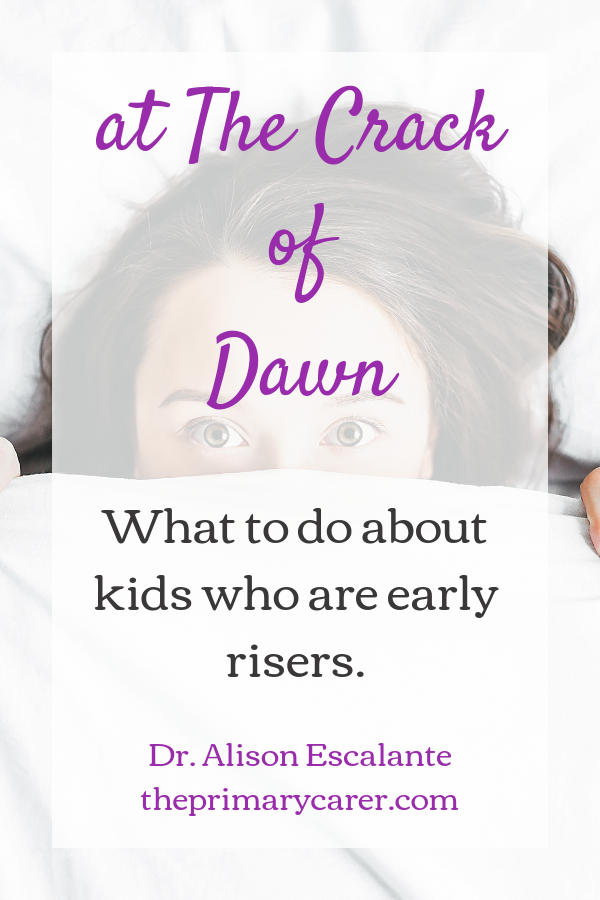It’s the crack of dawn, and your kids are up. AGAIN. What does it mean to have an early riser? Some kids get up as early as 430am every day, frustrating their tired parents. How do you deal with early risers?
This is a great opportunity to apply the 3S method in my TEDx Talk (The Parenting ‘ShouldStorm”) to a specific problem.
First, we want to recognize the ShouldStorm and how it affects us before we try to step out of it. What would my should be in this situation? Mine would be, “My kids should be sleeping until a reasonable human time in the morning.” At this point I remember that whenever we feel a Should, we Sigh, See and Start.
SIGH. Breath in deeply and let it out as slowly as possible. That slow out breath will move us into the calm and connected centers in the autonomic nervous system, so we can see clearly. As we sigh, we can connect with our bodies and how we feel. For instance, I might notice my anxiety, “How am I going to handle this to get them to stop? How am I going to handle this if they don’t stop?”
Then SEE. See your child’s behaviors. When they do get up in the morning, do they get out of bed? Do they come into your bed? What happens when they come into your bed? Are they rewarded for it? Do they get to stay? Do they get marched back to their room?
See your child’s emotions. See if they look angry. See if they look upset. See if they look scared. See if they look like they’re enjoying themselves irritating mommy and daddy. See if they’re whining.
Then, and only then, START. This is where we can pull in some of the available advice from our toolkit. Don’t let the tools highjack you and become shoulds. They are tools, and that’s all they are. The 3S’s put you in the driver’s seat, not the shoulds.
What do I do with an early riser?
So you’ve got a toddler who rises early. When we think about kids that won’t stay in bed, one tool is putting the kids to bed earlier. It turns out that this has to do with the sleep architecture in our brains and our circadian rhythms. In turns out that especially in children, early risers are often having a disruptive sleep pattern. If you put them to bed earlier, they often sleep longer. For many children, that means a bed time as early as 7pm, or even 6:30pm in younger children.
What if you’ve already done that? Consider light. The room needs to be 100% dark, and that’s a tough sell for a lot of people. When light comes into our room, it operates on our melatonin centers and it leads us to wake up or sleep less deeply. I’m a big fan of blackout curtains and moving away from the nightlight. If you can’t get rid of the nightlight, try one of those nightlights that turns off after 30 minutes. Some of them are cute huggable animals.

It’s key to avoid rewarding their behavior when they get up in the morning. They need to be expected to stay in their room. Your goal might be to get them to actually sleep, but I see it differently. My goal is to get them to leave me alone. My goal is to get them to stay in their room. This is where “okay to wake” lights can be really helpful. Some families have installed lights on a timer, they go on on a certain time and the child knows they are allowed to get up.
Do your best to effectively set a limit of what is going to happen if they don’t stay in their room until the predetermined time, whether that’s 630 or 7am. If you have been rewarding them for coming into your room, consider making it clear to them that you will start marching them back to their room every time they come in. This works, but only if all the caregivers in the house are committed. It’s useless if one adult holds the boundary and the other gives in.

If you’ve tried all these things and had no success, then there are two sources for the problem. There might be an actual sleep problem and it’s really worth meeting with your doctor about your child’s sleep. Or it may be a more complex behavioral problem that needs to be dealt with in a bigger context. That’s a great time to sit down with your child’s pediatrician.
This post was a response to a question from parents in our facebook group, Should-Free Parenting. Come join us to experience what parenting can be like when you explore the should-free zone in a supportive community.
Disclaimer: This article represents general education and does not constitute medical advice. My ideas are mine alone.


Excellent method to approach parenting (& life in general)! Love it!
Thanks for your comment! Life IS better when you approach it this way.